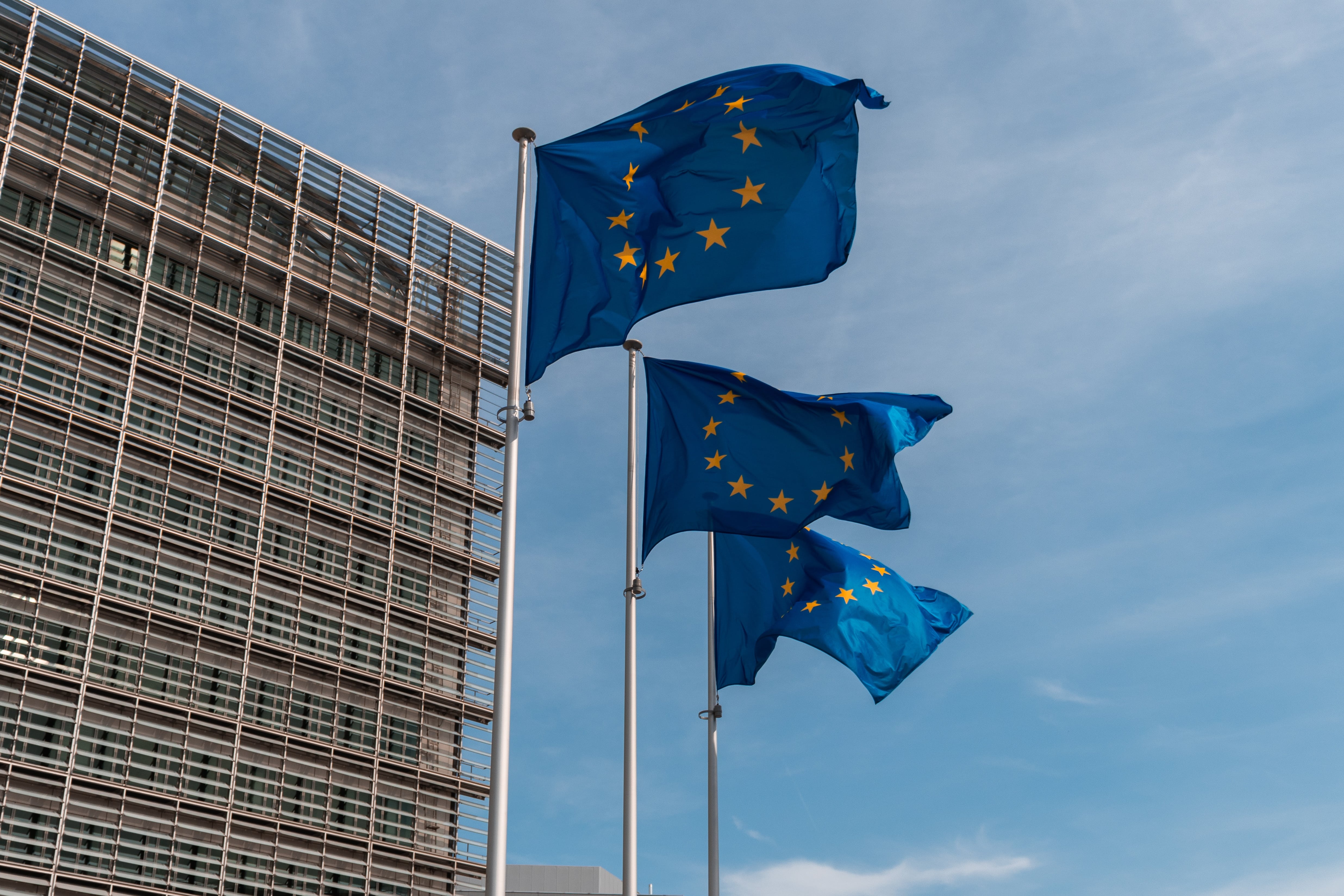
Policy WG meeting: ERA Policy Agenda going forward
As its first activity after the summer break, the ERRIN Policy Working Group is organising a meeting on the ERA Policy Agenda going forward. The event will take place in person at the ERRIN office on 18 September from 14:30-16:00, with welcome coffee from 14:00.
The European Research Area (ERA) aims to increase collaboration between the national research systems and to ensure better policy coordination between the Member States at the EU level. Originally launched in 2000, the ERA was renewed in 2020 starting with the adoption of the Commission’s Communication on a new ERA for research and innovation. The revitalised ERA’s ambition is to better address the societal, ecological and economic challenges, based on three pillars established in November 2021: new ERA governance involving the ERA Forum; adoption of a Pact for Research and Innovation in Europe; and a new ERA Policy Agenda with 20 concrete ERA actions for 2022-2024. In this frame, the ERA Forum serves for the Commission and EU countries to co-design and coordinate the implementation of the ERA actions, prepare future updates of the policy agenda and ensure the involvement of relevant stakeholders. ERRIN has been contributing to ERA and ERA Forum, fostering regional and local perspectives and following in particular ERA actions 10, 11, 15 and 16.
This Policy WG meeting will offer a chance to explore the added value for regions and their stakeholders of engaging in ERA actions, as the ERA Forum looks for their increased involvement. Participants will also be able to gain a better understanding of the ERA – its concept, state of play, future outlook and ERRIN’s role. Following introductory remarks from ERRIN, Sergej Možina, Co-Chair of the ERA Forum and Patrick Brenier, Adviser for ERA from the European Commission will introduce the ERA Policy Agenda 2022-2024, current developments as well as perspectives on the future. The presentations will be followed by an open exchange with the meeting participants.
In order to attend the event, please register by Thursday 14 September by pressing the blue “Register” button on this page. Please note that you need to be logged in to register, and that due to its character and limited room capacity this meeting is not open for trainees.
You may find the draft agenda attached.
Thank you for attending this Policy WG meeting. You may find the presentations from the session on this page.
- 18/09/2023 - 14:30 - 18/09/2023 - 16:00
-
ERRIN
Rue du Luxembourg 3 (8th floor)
1000 Brussels
Belgium - Ewa Chomicz
-
Working Group
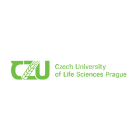
Expression of interest - "European AgriFood Sustainability Cluster Partnerships" call
The main objective of this call for proposals is to support both preparatory and implementation actions for the establishment and development of new “European Agri-food Sustainability Cluster Partnerships” supporting the implementation of the EU Code of Conduct on Responsible Food Business and Marketing Practices by SMEs. The call focuses specifically on boosting the uptake by SMEs of resource-efficiency technologies and countering food inflation in the EU.
The main expertise of the researchers lies within the following domains:
sustainable food production, supply risks, integrated supply chain, drivers and policies regarding food security, traceability of food, agricultural data and food analysis, resilient food system, time-based logistics, sustainable cities, sustainable farming. In addition, their field of study includes: emulsions, functional food, dairy technology as well as waste utilisation, dairy, and postharvest technologies.
Their team has extensive expertise in complex emulsions, dairy technologies, new product development, functional edible films, meat science and technology, food texture and rheology, and probiotics.
They also have participated in a number of H2020 projects.
For additional information and to express your interest, please contact Markos Papadopoulos at papadopoulos.markos@ucy.ac.cy.
- Markos Papadopoulos
- 04 August 2023
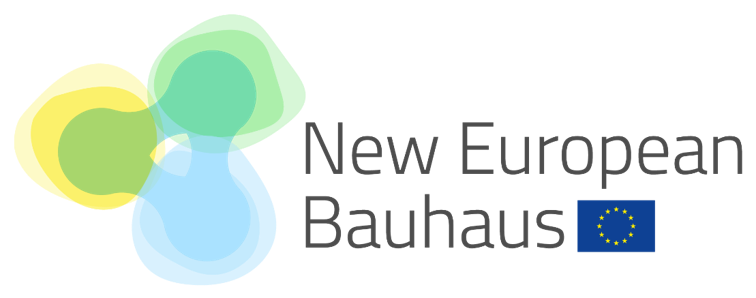
Call for regional examples: New European Bauhaus
Following the announcement on an NEB mission the ERRIN Task Force is organising an event on 3 October (15:30-17:00) focusing on the bottom-up approaches to NEB that have been developed during the last few years and their role in the Mission’s development. During the event, we’ll discuss our expectations towards the future NEB mission. The output of this meeting will be the first basis for an ERRIN position on the future of the NEB initiative.
We are looking for best practices on how local ecosystems gathered together to co-develop new strategies and activities using the NEB priorities and approach. The chosen regional representatives will be invited to pitch (5 min.) their experience and expectations towards the NEB Mission. To express interest please fill in the webform below. If you need more information, please contact gaia.marotta@errin.eu and agnieszka.wieczorek@errin.eu.
- Agnieszka Wieczorek Jetha
- 04 August 2023
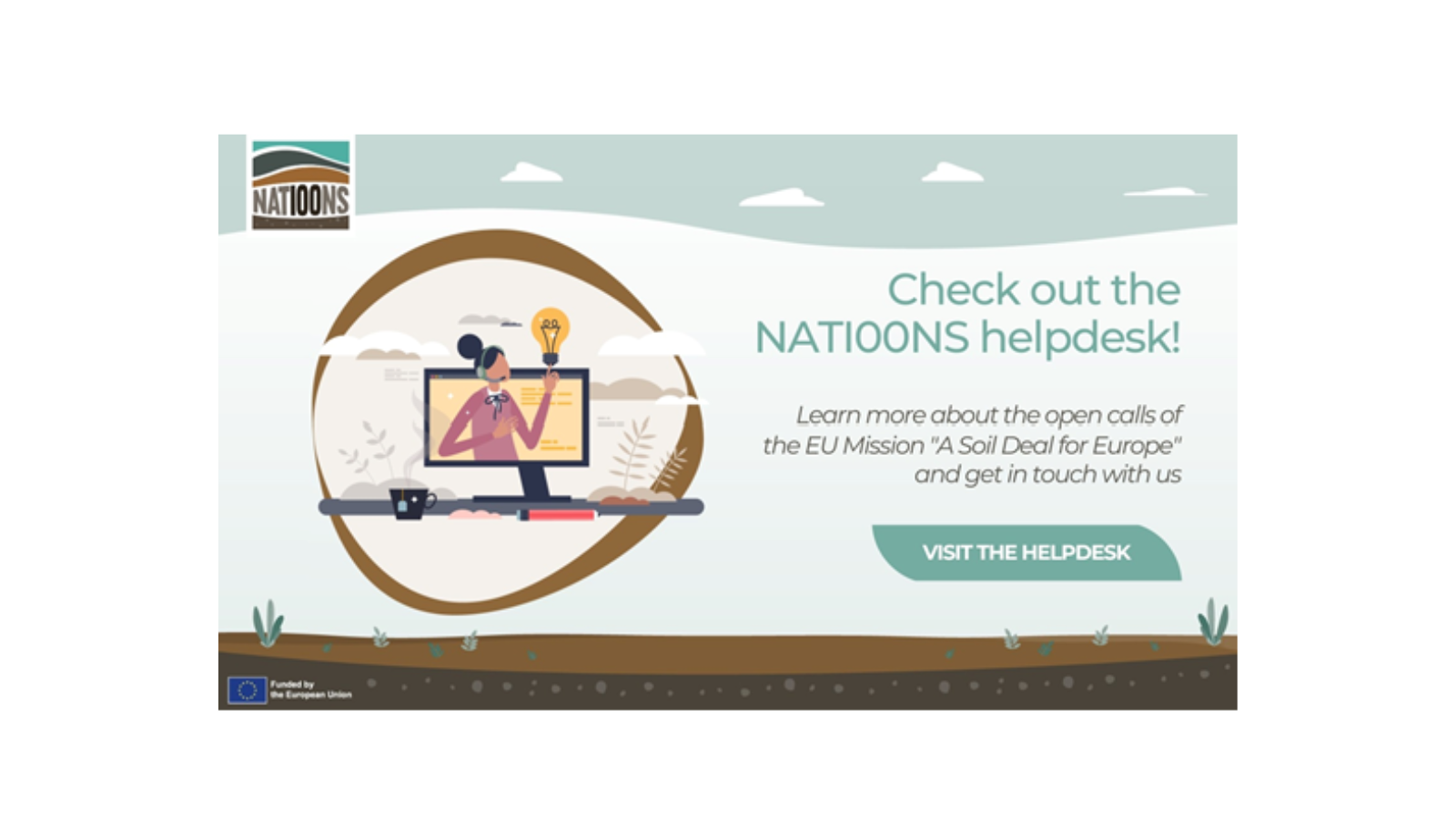
NATI00NS Helpdesk: support for the Soil Mission open calls
The NATI00NS project aims at preparing regional and national stakeholders across Europe to apply for and implement soil health Living Labs.
The project introduced its Helpdesk, providing assistance to applicants for topics 01-08 and 01-09 of the EU Mission 'A Soil Deal for Europe' open calls. The Helpdesk supports applicants in different ways, including explaining Open Call rules, application procedures, eligibility criteria, proposal validation, and answering scientific and technical questions related to the proposal scope.
To support applicants, the Helpdesk offers the following services:
- Frequently Asked Questions: applicants can find answers to common questions about the application process, suitable for both new and experienced applicants. The helpdesk provides valuable tips and guidance to ensure a successful application.
- Support webform: it can be used to submit specific requests related to the Mission, open call applications, or the establishment of soil health Living Labs and Lighthouses.
- Mentors: contact points in various Member States and Associated Countries act as mentors to potential applicants. They assist in organising ideas around a particular soil health challenge at the regional level and provide advice on the initial phases of setting up a Living Lab.
Learn more here.
- Gianpiero Petruzziello
- 03/08/2023
-
Working Group
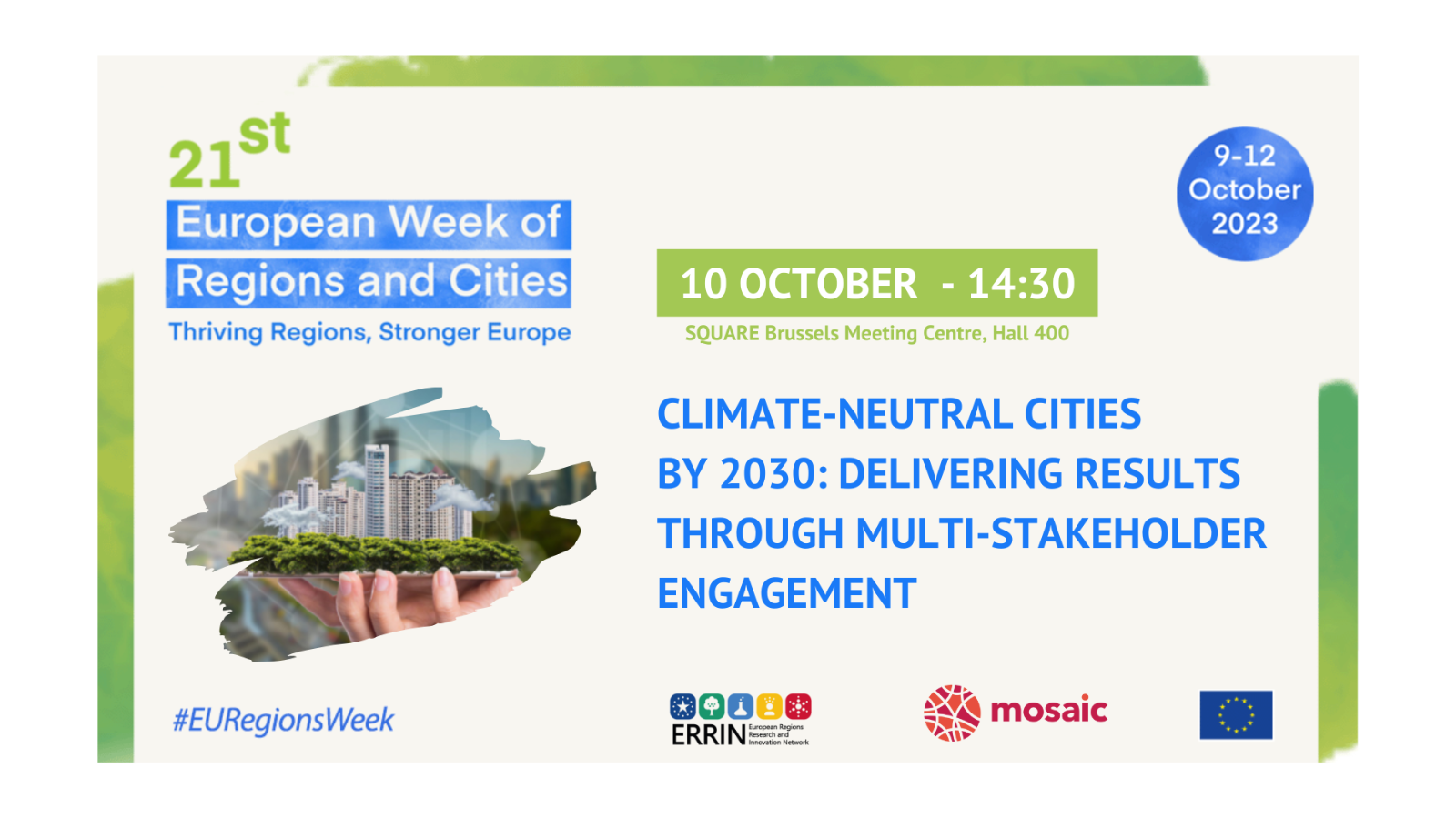
Climate-neutral cities by 2030: delivering results through multi-stakeholder engagement
ERRIN, together with the MOSAIC project and the European Commission, will host the session ‘Climate-neutral cities by 2030: delivering results through multi-stakeholder engagement’ at the European Week of Regions and Cities 2023.
The session, taking place at SQUARE Brussels Meeting Centre, Room 400 on 10 October at 14:30 CET, aims to explore the power of co-creation as a catalyst for social innovation on the path to climate neutrality.
The workshop will present the approach of four Mission Cities to multi-stakeholder engagement for climate neutrality, including examples of two co-creation processes carried out within the context of the EU-funded MOSAIC project. Through their presentations, attendees will gain valuable insights into the opportunities and challenges encountered when employing such collaborative methods.
The workshop will feature a dynamic fishbowl discussion, designed to foster active participation and knowledge sharing. The unique setup will involve one seat always being left vacant. As the conversation evolves, audience will be encouraged to occupy the empty seat, providing them with the opportunity to share their perspectives and ideas on climate neutrality and co-creation. This interactive format promises to create a dynamic and inclusive dialogue, allowing attendees to actively contribute to the discussion.
See the full agenda attached and register for the event here.
- 10/10/2023 - 14:30 - 10/10/2023 - 16:00
-
SQUARE Brussels Meeting Centre Hall 400
Mont des Arts
1000 Brussels
Belgium - Gianpiero Petruzziello
-
Working Group
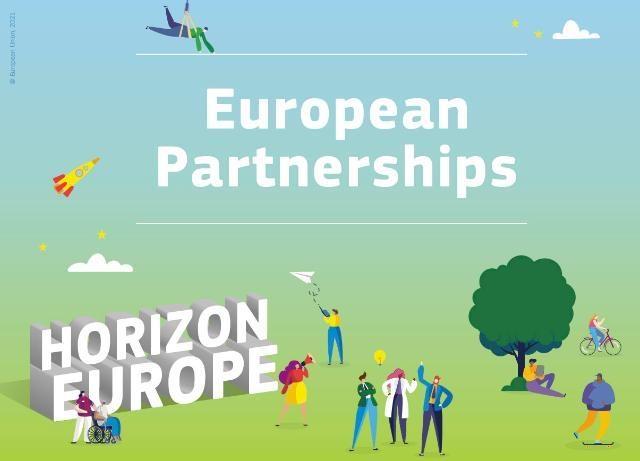
Open consultation: CCAM solutions in Europe
DG Research & Innovation is running a survey to gather insights, opinions, and expectations regarding the current state and future prospects of Connected, Cooperative, and Automated Mobility (CCAM) in Europe.
As presented during the Transport WG meeting on 2Zero and CCAM, which took place on 24 April, CCAM focuses on the development and deployment of connected and automated mobility systems, with the ultimate goal of improving road safety, reducing traffic congestion and enhancing the efficiency of the transport system.
Please find more information and access to the consultation here.
We remind you that ERRIN is seeking input from its members on their potential interest and willingness to participate in 2Zero and CCAM. The aim is to determine if these partnerships align with members' priorities. Please find the ERRIN survey here.
- Gaia Ialisa Marotta
- 02/08/2023
-
Working Group

Transport WG meeting - Digital Mobility Package: Multimodal Digital Mobility Services (MDMS) and European Mobility Data Space
In September the European Commission plans to present two proposals on digital mobility: the European Mobility Data Space and the Multimodal Digital Mobility Services regulation.
The communication on the mobility data space aims to facilitate access, pool and share data from existing and future mobility data sources. The goal is to create an improved, faster and more streamlined cross-border and cross-sectoral access to and sharing of data, which should lead to a more efficient, safe, sustainable and resilient transport system.
The proposal for a regulation on Multimodal Digital Mobility Services will establish a policy framework at the EU-level to facilitate market development of these type of services. This will be done by fostering the integration of operators on multimodal digital mobility services under fair, reasonable and non-discriminatory conditions. You can find out more about the background of the proposal via the presentations from our WG meeting on the topic in January.
Please find here the UITP POLIS EMTA technical input on the legislative proposal on MDMS.
- 25/09/2023 - 14:30 - 25/09/2023 - 16:30
-
ERRIN
Rue du Luxembourg 3
1000 Brussels
Belgium - Gaia Ialisa Marotta
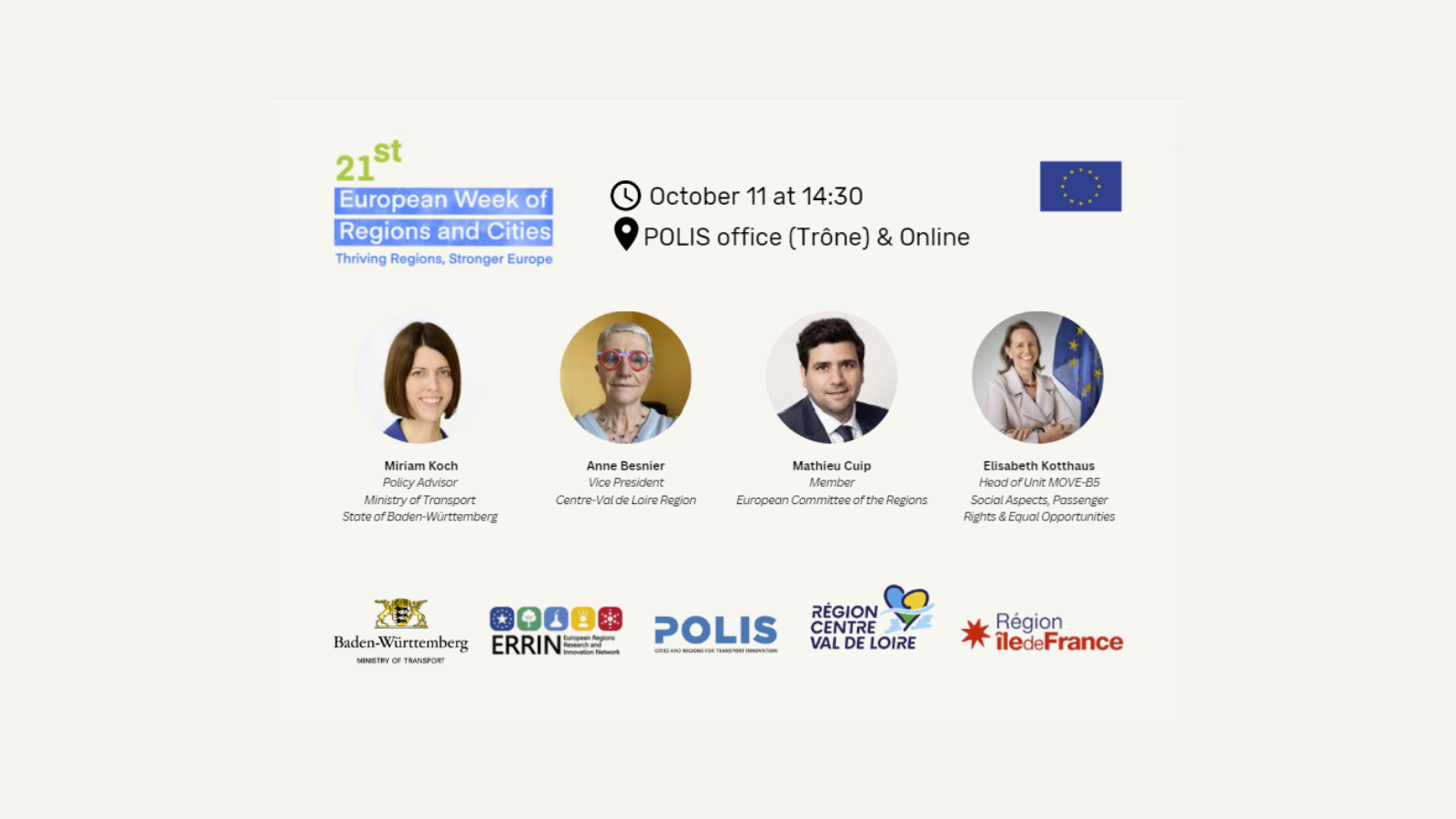
EU Regions Week: The future of transport workforce - retaining talent and developing skills for regional development
The transport sector is crossing a new digital frontier, with increased automation and connectivity, fostering benefits for users and the mobility system as a whole, including making transport safer, more accessible and sustainable. However, this presents a range of challenges for public authorities in retaining talent for regional growth. What job functions will be created, lost and transformed? What will the role of EU legislation be? How can public authorities ensure their voices are heard?
As part of the European Week of Region and Cities, ERRIN is joining Ile-de-France Region, Baden-Wurttemberg Land, Centre Val de Loire Region, the European Commission and POLIS network to discuss the challenges of digital transition in the transport sector, particularly focusing on the creation, transformation and loss of jobs.
Speakers include:
- Miriam Koch, Consultant, Ministry Of Transport Of The State Of Baden-Württemberg, Germany
- Anne BESNIER, Vice- President, Centre-Val De Loire Region
- Mathieu Cuip, Member, European Committee Of The Regions
- Elisabeth Kotthaus, Head of Unit, DG MOVE
Please find more information and register for the on-site meeting here. Every participant must have created and completed their EULogin account before registering for the session.
To attend the meeting online, please register here in addition to the registration above.
- 11/10/2023 - 14:30 - 11/10/2023 - 15:30
- This meeting will take place online
-
POLIS
Rue du Trône 98
1050 Brussels
Belgium - Gaia Ialisa Marotta
-
Working Group
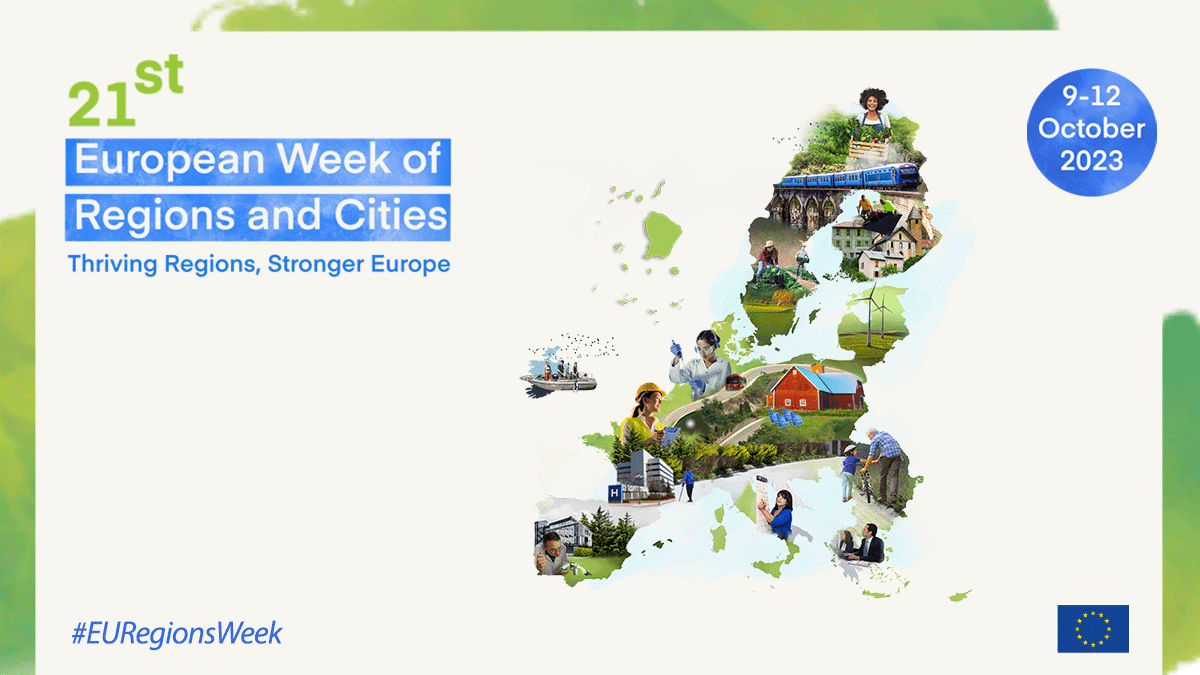
Retaining talents and skills for regional growth. What is the role of civil society partners?
The European Economic and Social Committee (EESC) is organising a workshop on "Retaining talents and skills for regional growth. What is the role of civil society partners?". The event will take place in person in Brussels on 11 November from 16:30-18:00 CET, as part of the official programme of the European Week of Regions and Cities 2023.
In order to attract talents and a skilled workforce, close cooperation must be developed between regional authorities, social partner organisations, employment services, and education and training providers. Social dialogue needs to be used effectively in order to attract companies to disadvantaged regions and ensure good quality jobs, good wages, job security via standard employment and access to social protection, and lifelong learning opportunities.
Astrid Hannes, ERRIN's Project and Policy Manager, will take part in the workshop as a speaker.
Learn more and register here.
- 11/10/2023 - 16:30 - 11/10/2023 - 18:00
-
European Economic and Social Committee
Rue Belliard 99-101
JDE building, Atrium 5 + Ledra 5
1040 Brussels
Belgium - Ewa Chomicz
-
Working Group
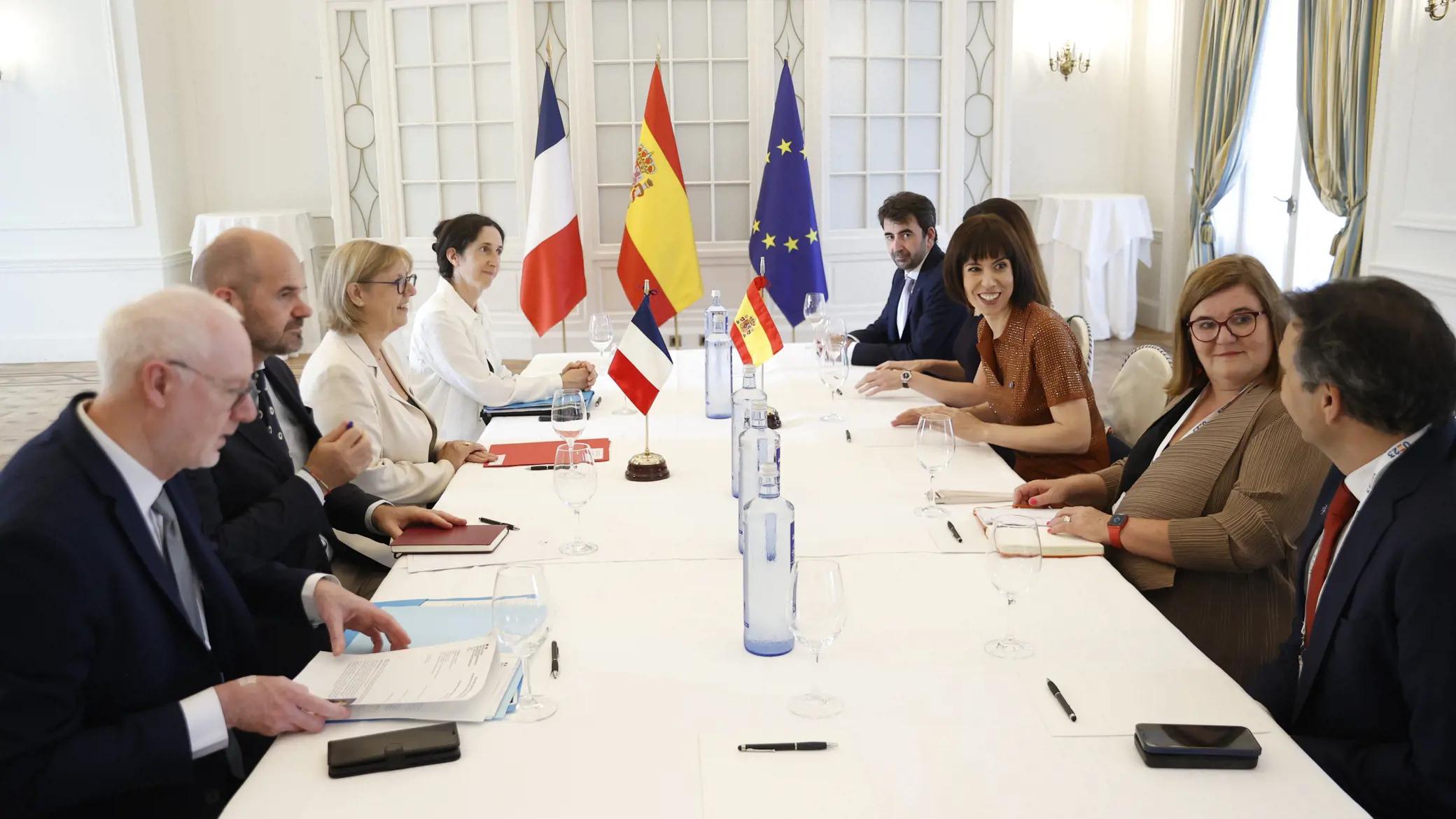
Spanish Presidency R&I priorities one month in
The Spanish Presidency of the Council of the EU kicked off on 1 July 2023. One month into the term, we take a closer look at the developments regarding priorities in the field of research and innovation from a regional and local perspective.
The Presidency aims to focus on strengthening R&I ecosystems and fostering initiatives to introduce them at all territorial levels. In this frame, one of the priorities is to develop Council Conclusions on strengthening the role and impact of R&I in the policy making process in democratic societies. Among the three main pillars to be addressed in this respect is the role of regional and local innovation ecosystems in improving cooperation and territorial cohesion through R&I (alongside the role of science in public policies and the impact of the Recovery, Transformation and Resilience Mechanism on R&I and sectoral policies, consolidating a European Research Area - ERA). Other goals of the Presidency include advancing the Commission’s proposals on EU missions and research projects, as well as consolidating and strengthening the Partnership for Research and Innovation in the Mediterranean Area (PRIMA).
ERRIN welcomes the emphasis on regional and local ecosystems, especially with the mid-term reviews approaching and reflections on the next EU Framework Programme starting.
The Council Conclusions should be adopted towards the end of the year, but the discussions around R&I priorities were launched already on 27-28 July in Santander, during an Informal ministerial meeting on competitiveness (research). The exchanges focused on four main topics: promoting innovation in the Mediterranean; emphasising the role of science diplomacy; presenting the IFMIF-DONES project on energy sustainability; and strengthening the Horizon Europe Strategic Plan 2025-2027.
On the strategic plan, the meeting aimed to reinforce it and ensure that its objectives are further aligned with European and national public policies and priorities. For example, synergies between R&I policies and programmes within the EU need to be further developed in line with the European Research Area objectives – a message supported by ERRIN as an active stakeholder in the ERA Forum. The network has been advocating for broadening the scope of ERA by explicitly including innovation; integrating a place-based research and innovation ecosystem approach; and applying a truly multi-level governance model where the regional and local levels are included.
Meeting participants also agreed that EU Missions and European Partnerships must improve not only through alignment of priorities but also in terms of the contribution of European funds – a point endorsed by ERRIN in its input paper to the Horizon 2014-2027 from February 2023, alongside the need for further involvement of regions in the initiatives.
Looking forward, ERRIN will continue closely following Spanish Council discussions around R&I, paying particular attention to planned work on the regional and local innovation ecosystems dimension.
Find all the priorities of the Spanish Presidency in its programme here.
Learn more about the Informal ministerial meeting on competitiveness on 27-28 July here.
- Ewa Chomicz
- 01/08/2023
-
Working Group